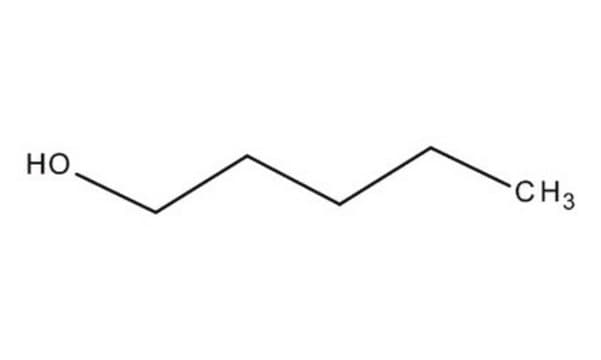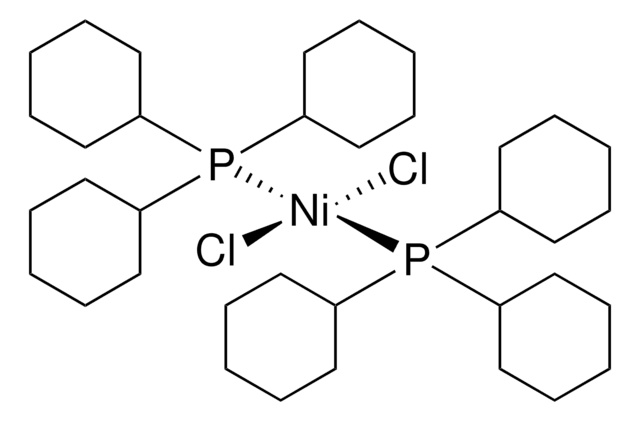8.06193
tert-Amyl alcohol
EMPLURA®
Synonym(s):
tert-Amyl alcohol, Amylenehydrate, 2-Methyl-2-butanol, tert-Pentyl alcohol, Dimethyl ethyl carbinol
About This Item
Recommended Products
vapor pressure
15.5 hPa ( 20 °C)
Quality Level
product line
EMPLURA®
Assay
≥99.0% (GC)
form
liquid
autoignition temp.
425 °C
potency
5200 mg/kg LD50, oral (Rat)
expl. lim.
1.3-9.6 % (v/v)
pH
6.0 (20 °C, 118 g/L in H2O, neutral)
kinematic viscosity
5 cSt(23 °C)
bp
102 °C/1013 hPa
mp
-8.4 °C
transition temp
flash point 20.5 °C
solubility
118 g/L
density
0.81 g/cm3 at 20 °C
storage temp.
2-30°C
InChI
1S/C5H12O/c1-4-5(2,3)6/h6H,4H2,1-3H3
InChI key
MSXVEPNJUHWQHW-UHFFFAOYSA-N
General description
Application
- Development of a green, concise synthesis of nicotinamide derivatives catalysed by Novozym® 435 from Candida antarctica in sustainable continuous-flow microreactors: Highlights the use of tert-Amyl alcohol in enzymatic reactions, offering a greener alternative for synthesizing complex molecules in pharmaceutical research (Sheng et al., 2024).
- Enzymatic Synthesis of Ascorbyl Palmitate in a Rotating Bed Reactor: Discusses the role of tert-Amyl alcohol in creating stable environments for enzyme-catalyzed reactions, enhancing product yield and process efficiency in biochemical applications (Holtheuer et al., 2023).
- Effects of magnetic fields on the enzymatic synthesis of naringin palmitate: Investigates how tert-Amyl alcohol can be used to enhance the solubility and reactivity of substrates in biocatalytic processes, critical for industrial biotechnology applications (Zhang et al., 2018).
- Ethyl esters production catalyzed by immobilized lipases is influenced by n-hexane and ter-amyl alcohol as organic solvents: Explores the effectiveness of tert-Amyl alcohol as a co-solvent in biodiesel production, demonstrating its impact on enzyme activity and stability in biofuel research (Borges et al., 2020).
Analysis Note
Density (d 20 °C/ 4 °C): 0.808 - 0.809
Identity (IR): passes test
Legal Information
Signal Word
Danger
Hazard Statements
Precautionary Statements
Hazard Classifications
Acute Tox. 4 Dermal - Acute Tox. 4 Inhalation - Eye Dam. 1 - Flam. Liq. 2 - Skin Irrit. 2
Storage Class Code
3 - Flammable liquids
WGK
WGK 1
Flash Point(F)
68.9 °F - closed cup
Flash Point(C)
20.5 °C - closed cup
Certificates of Analysis (COA)
Search for Certificates of Analysis (COA) by entering the products Lot/Batch Number. Lot and Batch Numbers can be found on a product’s label following the words ‘Lot’ or ‘Batch’.
Already Own This Product?
Find documentation for the products that you have recently purchased in the Document Library.
Customers Also Viewed
Related Content
Our ergonomic 1 L HDPE bottle for acids, bases, and solvents provide an alternative to glass chemical bottles for lab safety in pouring & handling of hazardous chemicals in the laboratory.
Our ergonomic 1 L HDPE bottle for acids, bases, and solvents provide an alternative to glass chemical bottles for lab safety in pouring & handling of hazardous chemicals in the laboratory.
Our ergonomic 1 L HDPE bottle for acids, bases, and solvents provide an alternative to glass chemical bottles for lab safety in pouring & handling of hazardous chemicals in the laboratory.
Our ergonomic 1 L HDPE bottle for acids, bases, and solvents provide an alternative to glass chemical bottles for lab safety in pouring & handling of hazardous chemicals in the laboratory.
Our team of scientists has experience in all areas of research including Life Science, Material Science, Chemical Synthesis, Chromatography, Analytical and many others.
Contact Technical Service













